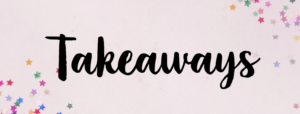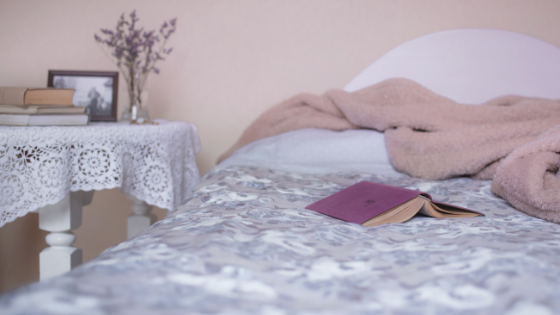I live by a balance of routines, rhythms, and rituals.
I worked hard to test out different practices and find a pattern that supported me well. Recently, however, my triple-R system has been off, which means I’ve been leaning heavily on another R: rest. Although my research on productivity and personal development has proven to me the benefits of rest, I had never NEEDED to rest as often as I’m needing to now.
A couple of weeks ago I underwent allergy testing, which meant I couldn’t have any supplements, fruit and veggies, or antihistamines (these all mess with the way your body reacts to the hundreds of injections of allergens). I also received some answers about my mystery symptoms, and was encouraged to try a whole new round of treatments for autoimmune and viral imbalances. While my hope is that these treatments will contribute to my healing, some of the medicines function by breaking down the negative stuff and releasing it from my body. This means I might experience the Herxheimer or “Herx” reaction, where those releasing toxins could cause me to feel worse before I start feeling better.
Hence my desire to give myself permission to rest.
Focusing on Rest
Earlier this year, I wrote a blog post about how to make a rest and recharge toolkit. That post walks you through a four-step process:
- Step 1: Evaluate Your Relationship with Rest
- Step 2: Identify Your Energy Zappers
- Step 3: List Your Non-Negotiables
- Step 4: Set Yourself Up for Success
Those four steps helped me develop my current personal toolkit, which includes recharge activities like maintaining my immune system with supplements and using pulse and pause work methods like Pomodoro to take short breaks while I work. My toolkit allows me to recharge my spoons and approach each day’s work with renewed focus and energy. There is a chance that my next few months may call for me to increase my resting practice, so in addition to adjusting my expectations for my productivity output, I want to build a lifestyle that allows for more intentional rest.

What Rest Really Looks Like
I asked you all via Instagram, Facebook, and email (you can subscribe to my email list here!) what rest looked like to you. I thought your answers were all so brilliant, and I wanted to share them as this week’s takeaways.
Rest is not a “one size fits all” practice. Depending on your personal experiences, some of these rest practices will be easily applied today, whereas some of them might be inaccessible to you at this time and place in your life. However, I want to normalize the action of intentional rest. I want to give you permission to see resting as necessary and to create a lifestyle that prioritizes it. I want to share with you different rest actions that people practice so that you might give them a try, too. I encourage you to understand rest as something you can do in different spans of time and in different spaces. I want to tell you that it is okay to need to rest.
Your Answers to “What Does Rest Look Like to You?”
- “Get outside, take a nap, play with the toddler and cook from scratch.” [email protected]
- “Rest for me is often quiet, giving myself space without a constant barrage of INPUT to process. Shifting to thinking and feeling with my body instead of with my mind. Moving, cooking, walking, dancing, napping, bathing.” -Kristi
- “Not answering emails and not feeling guilty about it.” -@lorenalopez9
- “I rest by drinking a Manhattan and playing cribbage. I rest by falling asleep listening to spring peepers. I rest by taking a long bath. I rest by walking in the woods.” -@potterallison
- “On the floor on my back and under my 35lb weighted blanket (feet to chin).” -Richard
- “Rest means to me noncommittments to others, a cool, dark, room and either sleep, sit, read, or watch a television show that is junk food for my brain.” -Amy
- “Rest for me is not having any responsibilities. Staying at home or going out and doing something because I want to, not because I feel obligated by someone else or have a prior commitment.” -@ohadelecan
- “Yoga, napping.” -@life_of_learning
- “Sometimes I watch movies or youtubes and sometimes I just lay quietly.” -@artemisiasolstice
- “Rest for me is not an action point, it’s a state of mind. I can be working a LOT and feel rested if I am still spending quality time with my family and I have ample #metime.” -@productivephdninja
- “Pleasure reading, writing letters/calling friends exploring new places outside mindful meditation.” -anonymous
- “As I struggle with fatigue, ‘total’ rest is important–lying down in a darkened room, no screens!” -@amelia_may
- “For me, there’s two types of rest. There’s the rest day where I try to do nothing at all except doing fun (usually social) things, maybe sleep in, and just try to not stress. I can’t do this all the time though. There’s also short term resting on other days where I try to take an hour to just chill and not do anything, or I do stuff that will make my life easier for tomorrow. Like prep snacks for work. Or I read a book before bed, or I go to sleep earlier. Something that will put my mind at ease.” -@embroiderythread
- “Taking a nap.” -@anneavril
- “Rest for me is correlated with having a clean, tidy living space. It doesn’t really matter what I’m doing (or not doing) but I noticed that freeing myself of clutter helps me feel more rested.” -@bopeepery
- “Hot bath w candle sometimes, bed early, lotsa un-peopleing, daydreaming while walking” – Sabrina
- “Just simply making a conscious decision to turn off my brain to anything related to science, teaching, or lab work. That’s not easy to do most of the time but the nights that I trust myself and believe that everything can be put off until tomorrow or Monday, are the nights I sleep well and actually realize I’m enjoying what I do and that it doesn’t always have to be a a huge ball of stress. And believe me, most everything can wait until tomorrow so you can take time to come down today. Just doing ANYTHING not related to work for a while is rest for me. dont even want to know the countless weekends I gave up hoping for a result that never came on the weekend I gave up.” -@thepersnicketydoctor
Do you have a rest practice? Share it on this week’s Instagram post!
This blog is not affiliated with, associated with, or endorsed by the Pomodoro Technique® or Francesco Cirillo.
newsletter and free resources
Sign up below to access six free resources and my newsletter, tending.

